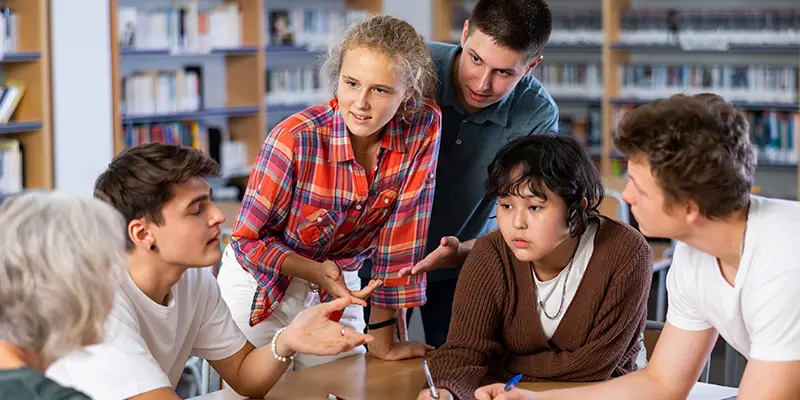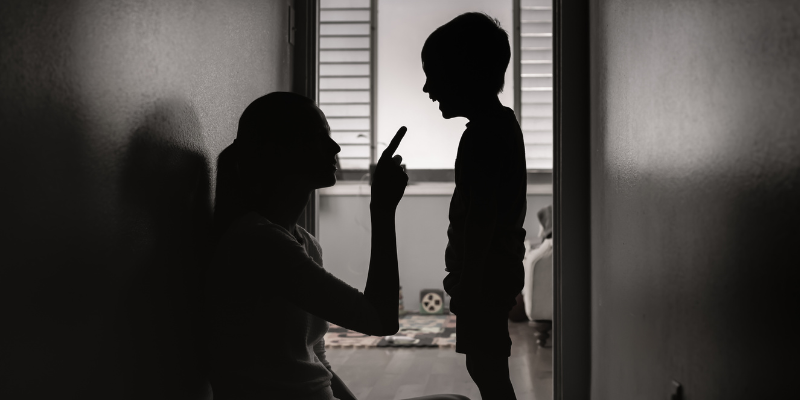
We already know that contracting COVID-19 can damage the brain, but researchers are finding that even living through the overall experience of the pandemic has had detrimental effects on our young people. A study published in December 2022 in Biological Psychiatry: Global Open Science, which compared MRI scans from 163 teens both before and during the pandemic, offered up some interesting findings in terms of how these years of COVID-19 have impacted adolescents’ brains. One researcher noted in the post-study press release that subjects assessed after pandemic-related shutdowns “not only had more severe internalizing mental health problems, but also had reduced cortical thickness, larger hippocampal and amygdala volume.”
In other words, these pandemic-era teen brains look several years older than would be expected—showing the kinds of changes that previously had been associated with children facing chronic adversity, such as domestic violence, neglect, or dysfunction in their households. Time will tell if these changes lead to worse mental health outcomes in the short- or long-term, if the changes will prove to be permanent, or if these brains will normalize over time.
Either way, this study highlights the importance of the physical changes that are still occurring in brains during the teen years—which take place all the way into the mid-20s (and as late as age 28 in men). Let’s look at what’s happening behind the scenes to better understand the crucial brain developments that are taking place in teens.
While healthy routines are a great idea, be mindful of not getting too stuck in a rut—teens benefit from establishing those positive habits, but not leaving room for creativity and challenging oneself will actually be detrimental. Click To TweetTEEN BRAIN DEVELOPMENT THROUGH THE YEARS
We’ve all heard that it’s easier to learn a new skill—a sport, musical instrument, or second language—when starting at a younger age. That’s because as early as age 11, the brain starts to shed connections that are not being utilized. Other typical developments in the preteen and early teen years include thinking for themselves, seeking to define their identity, and pushing back against their parents (which often includes testing boundaries and limits).
By 14 years old, teens can further separate themselves from their parents and even become withdrawn or critical of them in further efforts to individuate. They may start to consider or gravitate toward a certain career or life path, and they’re likely to be increasingly concerned about their looks. Friendships may come and go, but at the same time, these connections are increasingly important in their lives. Thus, peer pressure and influence are also strengthening from the early teen years, which can be positive if the surrounding environment is a healthy one—or dangerous when getting mixed up with the wrong crowd, like one that is modeling underage drinking or cannabis use. Because these habits exert serious negative impacts on the brain, they can be especially insidious for young people, since they disrupt or delay healthy development.
Though parents may become frustrated about teenagers who assert their independence yet still make the wrong decisions or take unnecessary risks, keep in mind that this reflects a normal stage of the brain’s development. That’s because the prefrontal cortex (PFC)—involved with judgment, impulse control, and learning from mistakes—is the last part of the brain to develop, and it’s still maturing through adolescence and even into the 20s.
During this time, emotions can overrule logic, and simultaneously the limbic system is particularly active (influencing feelings, bonding, and peer acceptance), leading to a strong desire to fit in. Therefore, it’s important for parents to model the right behaviors and step in when needed to guide teens on their decisions, then help them process through negative consequences to encourage them to learn from their mistakes.
Luckily, this rocky mid-teen stage doesn’t last forever. Though their brains are still developing, by the late teens (17 to 19 years old), they have established a firmer sense of their own identities, have learned to delay gratification, and are able to better understand potential consequences before they act. Meanwhile, the PFC continues to develop, leading to better judgment, and late teens’ relationships generally enjoy more stability.
CREATING HEALTHY VS. UNHEALTHY TEENAGE BRAINS
Too many teens are not receiving the benefit of education on mental health topics—even though most of them (more than 86%) believe it is an important subject—but remember that mental health is brain health. Like adults, teenagers benefit from brain optimization—after all, in these key years of development, we are setting the scene by creating healthy habits that will ideally carry through the rest of life. And, when we can optimize the physical function of the brain, we create better moods.
Moreover, young people today are facing many different challenges than in previous generations. In addition to the effects of the pandemic, technology has certainly helped contribute to shrinking attention spans—one recent study by Microsoft found that humans now have an 8-second attention span (1 second less than a goldfish), while modern-day practices like excessive texting and multitasking can shed 10 IQ points off a human brain!
That’s not all. Those who obsess over social media have been shown to have a smaller area of the brain that executes key functions like processing emotions and showing restraint, meaning that these people can exhibit more impulsive behavior, with less emotional regulation. This is especially concerning in teen brains, which are still developing in the PFC region.
How can we help teen brains become more healthy as they develop? There are a host of behaviors that should be avoided, while teens should seek out those activities and habits that boost brain health. Here are some examples of what to avoid:
- Excessive screen time, including computer use, cell phones/texting, TV, and video games
- Environmental toxins
- Use of drugs, including alcohol, smoking, and excess caffeine
- Negative thinking, high stress, and/or irrational fears
- Poor diet or dehydration
- Poor sleep
On the other hand, healthy practices can include mental and physical exercise, meditation, gratitude and appreciation practices, relaxation techniques to lower stress levels, avoiding sports that expose teens to brain injury, maintaining a healthy weight, positive thinking, and listening to classical music (shown to increase energy and focus). And, while healthy routines are a great idea, be mindful of not getting too stuck in a rut—teens benefit from establishing those positive habits, but not leaving room for creativity and challenging oneself will actually be detrimental.
For many of us, the teen years were a tumultuous but unforgettable time—full of ups and downs, high drama and humbling life lessons, close school chums, and beloved school memories. But nowadays we have a lot more information about the brain’s workings to explain all of those once-mysterious feelings that accompany our coming of age, and we know how to set up our young people for a lifetime of success ahead by instituting those healthy habits early!
Brain and mental health issues can’t wait. At Amen Clinics, we’re here for you. We offer in-clinic brain scanning and appointments, as well as mental telehealth, clinical evaluations, and therapy for adults, teens, children, and couples. Find out more by speaking to a specialist today at 888-288-9834 or visit our contact page here.





Sadly, these effects are not from the pandemic itself, but from the insane, illogical measures and fear-pushing that took place. The effects on teens were expected , however no amount of warnings on my part to any school or authority got anywhere. I countered the narrative to my kids any time I could, we traveled, had fun, and they are the most normal kids developmentally and socially in their class. Sad.
Comment by Rebecca — March 27, 2023 @ 6:13 AM
As a licensed and practicing Mental Health Professional I find this article very interesting. Children with immature brain development are being diagnosed with gender dysphoria by mental health professionals. Subsequent to this diagnosis these children are provided with medical interventions that are criminally inappropriate because of their immaturity.
I’m hopeful that these terrible practices will be outlawed by government on all levels.
Comment by Irwin Isaacs — March 27, 2023 @ 6:39 AM
I wonder is not mentioned anything against “vaccine” related brain damage. Profesor Campra from Almeria University- has tested all of the one’s given against Covid-and found they contain Graphine Oxide- Why not make more tests to prove the safety of the so called “vaccines?”
Comment by Esther — March 27, 2023 @ 9:29 AM
The study needs to include if those teens, children, have had any of the covid shots.
Comment by Heather B — March 27, 2023 @ 10:53 AM
I am so grateful that you generously give this important information. It makes such a difference – thank you
Comment by Sharon — March 27, 2023 @ 1:43 PM
Thank you Dr. Amen, I got a 13-year-old daughter and I share all your knowledge with her! She ate vegetables without complaining. mobile off at 7:30 pm and went to bed at 10 pm 🙂 #HappyMum #HappyTeenager
Comment by Patty Taylor — March 29, 2023 @ 2:18 AM
My Granddaughter was 17 in 2020. 2 days ago she attempted suicide. She is now in a mental health facility for the 5th time. Usually there for a week or so, then released with meds, which she refuses to take. She was a athlete, high grades in school, terrific young girl until Covid hit. Unfortunately, Personally I think she is not getting proper diagnosis. Would bring her to Amen, but don't get a response from you either. Would have to accept Medicaid. Thank you.
Comment by John — March 29, 2023 @ 5:09 PM
My daughter and her 5 year old grandson moved back in with me a couple years before the pandemic hit. She had set rituals and habits up to adjust to the new life change. So because of her diligence, we were so happy and thankful we were prepared, especially when the pandemic hit. Thank goodness my daughters prime mission as a mom was to set up daily schedules and rituals.
So when everything upruptly changed and lock downs started (and they were very strict in our location) people became mean and aggressive. Neighbors, community members, even friends changed before our very eyes. We as a family decided we would not let this become our reality, so every week we had a family meeting to discuss important topics. These included the reactions of people when lives are disrupted and how we as a family and individually reacted to the issues. We also made sure to find things to be grateful for each day. We went on outings every week, even if our parks, forest preserves and running trails were off limits and everything was closed. We would walk down a street and observe the way people decorated their outside of homes, with gardens, flowers, and decorations. We would also have a craft night, a game night, a music and dance night and a movie night to get ourselves out of the dread and into the fun. We took up baking classes, started gardening and found other things to keep occupied.
When certain riots broke out near us and tore our town apart, we prayed for those injured and those who injured. When woke agendas started flooding in we discussed normal development and some ways we can fall off that path both psychologically, emotionally, and spiritually. Lots of discussions and lots of grace in our conversations. If things didnt make sense we talked them out, sometimes with some rough conversations, but usually respectful. We kept our routines, even if school was at home on a laptop, and we treated it seriously. My daughter lost her job due to the pandemic and her childs new school routine, but she made great efforts to maintain a routine and regular schedule.
Now 3 years after those first days, we have kept some of these practices. My grandson is now 10 and we now discuss cartoons, world events, and favorite books. My grandson says he feels many in his class are sad and fight a lot. He says he tries to help when he can, but sometimes he steps away so he does not get hit since violence and agression has become a real issue at school. He is still at an age where he wants to please, but some of his new personality is starting to show. When he has topsy-turvy days, he has learned that talking things out makes sense and even though he says he would not really like to talk about stuff, afterwards he feels better and goes on with his day.
I am hoping in his case we circumvented some of the aforemention issues pertaining to adolescence. The world has come out of this scathed and everyone has been affected. My hope is we move from the direction we are heading to one rhat addresses the underlying issues mental health. The health of our mind, body, and spirit are all important. When one is out of sync, our health fails and we then start compensating.
Thank you for your article. I have printed it up to discuss at our next family meeting.
Comment by Amy — April 5, 2023 @ 5:39 PM